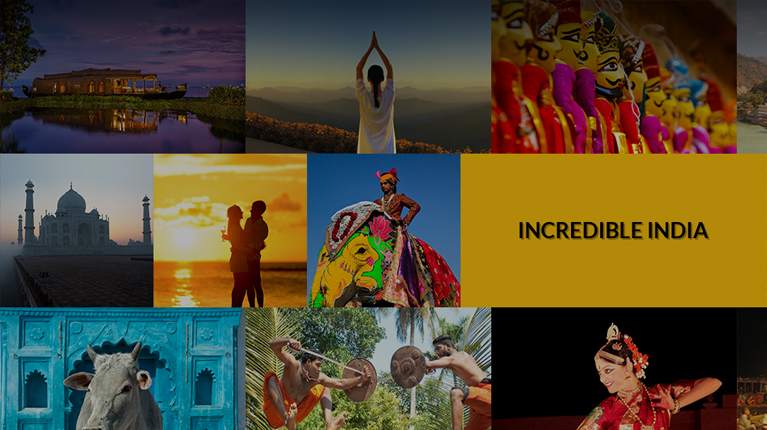

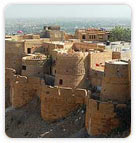 Rajasthan means land of Rajas or Kings. Earlier Rajasthan was known as Rajputana which means the country of Rajputs, a warrior clan. Golden Sand tour of Rajasthan will take you to the vast deserts of Jodhpur, Jaisalmer & Bikaner. These cities lie on the edge of the Thar Desert & also played a very significant role in trade route linking India to Egypt, Arabia, Africa & the Western countries. Travel to Jodhpur, Jaisalmer, Bikaner & experience the way of living of the people in desert areas, their colourful culture, customs & traditions, etc.
Rajasthan means land of Rajas or Kings. Earlier Rajasthan was known as Rajputana which means the country of Rajputs, a warrior clan. Golden Sand tour of Rajasthan will take you to the vast deserts of Jodhpur, Jaisalmer & Bikaner. These cities lie on the edge of the Thar Desert & also played a very significant role in trade route linking India to Egypt, Arabia, Africa & the Western countries. Travel to Jodhpur, Jaisalmer, Bikaner & experience the way of living of the people in desert areas, their colourful culture, customs & traditions, etc.
The best time to visit is from September to March. During this time the vibrant colours, music & festivals make the golden sands of Rajasthan come alive.
Duration: 11 nights - 12 days
Locations: Delhi –Agra- Jaipur – Jodhpur- Jaisalmer – Bikaner- Mandawa- Delhi
| Tour Highlights | |
| Delhi | Red Fort, Raj Ghat, Jama Masjid, Chandni Chowk, India Gate, President's House, Humayun's Tomb & Qutub Minar Optional Sound & Light Show at Red Fort with dinner at Chor Bizarre |
| Mathura & Vrindavan | Shri Krishna Janmabhumi Temple, Bankey Bihari Temple & ISKCON Temple |
| Agra | Taj Mahal, Agra Fort, Sikandara |
| Fatehpur Sikri | Akbar's Residential complex, Mosque & Tomb of Salim Chisti |
| Jaipur | Elephant ride to Amber Fort Palace , City Palace, Jantar Mantar (Observatory) & Hawa Mahal (Palace of Winds) Optional Cultural evening at Chokhi Dhani |
| Pushkar | Brahma Temple, Lake & other Temples |
| Jodhpur | Mehrangarh Fort & Jaswant Thada |
| Jaisalmer | Jaisalmer Fort , Jain Temple, Patwon Ki Haveli & Camel Safari on Sand dunes |
| Bikaner | Junagarh Fort & Lal Garh Palace |
| Mandawa | Havelis (Mansion) of Goenka, Gori Shankar & Choudaharia with Frescoes |
Detailed Itinerary
Day 01: Arrive Delhi
Arrive by International flight, after traditional 'Swagat' (Welcome) our representative would assist you at airport & transfer to hotel for check in.
Delhiisa bustling metropolis, which successfully combines in its folds the ancient with modern. Its strategic location was the prime reasons why successive dynasties chose it as their seat of power. In fact, more mythological cities are believed to be here, like the city of Indraprastha from the Hindu epic Mahabharata, founded around 5000 BC. Numerous monuments were built over several centuries by different rulers like Qutub-ud-din Aibek, Alauddin Khilji, Tughlaks, Humayun & Shah Jahan, who built the Walled City Shah Jahanabad.
Later in first half of 20th century much of New Delhi was planned by Sir Edwin Lutyens, who laid out a grandiose central administrative area as a testament to British rule in India. The division in walled city & New Delhi also marks the division in life styles.
Overnight Hotel – Delhi (B)
Day 02: Delhi
Full Day Tour
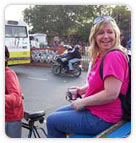 Today we take a guided tour of Old Delhi, the 17th century walled city of Shah Jahanabad, Visiting the great Jama Masjid, the principal mosque of Old Delhi. Built in the year 1656 AD by the Mughal Emperor Shah Jahan, it is the largest & best known mosque in India. Later we walk down or take a rickshaw ride through Chandi Chowk, the old marketplace of Shah Jahanabad now a picturesque bazaar to reach Red Fort, built in the year 1648 by Shah Jehan.
Today we take a guided tour of Old Delhi, the 17th century walled city of Shah Jahanabad, Visiting the great Jama Masjid, the principal mosque of Old Delhi. Built in the year 1656 AD by the Mughal Emperor Shah Jahan, it is the largest & best known mosque in India. Later we walk down or take a rickshaw ride through Chandi Chowk, the old marketplace of Shah Jahanabad now a picturesque bazaar to reach Red Fort, built in the year 1648 by Shah Jehan.
In New Delhi, we visit Raj Ghat, memorial to the Father of the Nation, Mahatma Gandhi. It is a simple black marble platform that marks the spot of his cremation on 31 January 1948. Further we drive past India Gate, memorial built in the year 1931 to commemorate the Indian soldiers who died in the World War I & the Afghan Wars. The names of the soldiers who died in these wars are inscribed on the walls. President's House, the official residence of the President of India, built in the year 1931. Until 1950 it was known as Viceroy's House & served as the residence of the Governor-General of British India. We will also visit Humayun's Tomb, memorial of Mughal Emperor Humayun, built in the year 1562. The complex is a World Heritage Site & the first example of this type of Mughal architecture in India. Qutub Minar, built in the year 1206 by Qutub-ud-din Aibek. It is the tallest (72m) brick minaret in the world, an important example of Indo-Islamic Architecture. Qutub Minar & its monuments are listed as a UNESCO World Heritage Site.
Optional - Sound & Light Show at Red Fort with dinner at Chor Bizarre
Overnight Hotel – Delhi (B)
Day 03: Delhi - Agra (220 km–5 hr)
Today we drive to Agra, beautifully situated on the banks of river Yamuna. It achieved prominence as the capital of the Mughal Emperors from the year 1526 to 1628, remains major tourist destination because of its many splendid Mughal-era monuments, most notably the Taj Mahal, Agra Fort & Fatehpur Sikri, all three are UNESCO World Heritage sites.
En route Mathura & Vrindavan
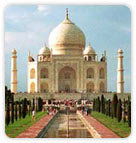 En route visit Mathura & Vrindavan, places related with the birth & childhood of Lord Krishna. In Mathura we visit Shri Krishna Janmabhumi temple, a stone slab marks the original birth place of Krishna. In Vrindavan we visit Bankey Bihari Temple, built in the year 1864. Temple is famous for the black statue of Krishna, also called as Thakur Ji. ISKCON Temple, one of the most beautiful temples in Vrindavan. Temple is devoted to Krishna, his brother Balaram & Krishna's beloved Radha.
En route visit Mathura & Vrindavan, places related with the birth & childhood of Lord Krishna. In Mathura we visit Shri Krishna Janmabhumi temple, a stone slab marks the original birth place of Krishna. In Vrindavan we visit Bankey Bihari Temple, built in the year 1864. Temple is famous for the black statue of Krishna, also called as Thakur Ji. ISKCON Temple, one of the most beautiful temples in Vrindavan. Temple is devoted to Krishna, his brother Balaram & Krishna's beloved Radha.
Half Day Tour
Later we visit Taj Mahal, symbol of eternal love, which stands on the banks of River Yamuna. It was built by the 5th Mughal Emperor, Shah Jahan in the year 1631 in memory of his wife, Mumtaz Mahal. It was completed in 22 years. Further we visit Agra Fort, taken over from the Lodhis by the Mughal Emperor Akbar in the late 16th century. The Fort can be more accurately described as a walled palatial city. It was built from red sandstone, often inlaid with white marble & intricate decorations. We will also visit Sikandara, Akbar's tomb. His son Jahangir completed the construction of the tomb in the year 1613.
Overnight Hotel – Agra (B)
Day 04: Agra – Jaipur via Fatehpur Sikri (260 km - 6 hr)
Today we drive to Jaipur en route we will visit Fatehpur Sikri (Ghost Capital), the political capital of India's Mughal Empire under Akbar's reign, from the year 1571 until 1585, when it was abandoned, ostensibly due to lack of water. We visit Emperor Akbar's Residential complex,Mosque & Tomb of Salim Chisti.
Later we continue our drive to Jaipur, popularly known as Pink City, the flamboyant & colourful capital of Rajasthan. With its rich & colourful past, resplendent with tales of valour & bravery, it is now one of the most important heritage cities in India. The city was founded in 1728 by Maharaja Sawai Jai Singh II, the ruler of Amber. It remains the only city in the world symbolizing the nine divisions of the universe, through nine rectangular sectors.
Overnight Hotel – Jaipur (B)
Day 05: Jaipur
Full Day Tour
Today we take an excursion to Amber Fort (11 km); the palace complex which stands to this date was commenced under the reign of Raja Man Singh. We take an Elephant ride to reach the Fort situated on the hill, an overwhelming experience.
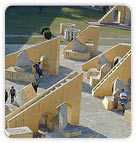 Later we visit the City Palace, a perfect blend of Rajasthani & Mughal architecture. The center of the palace is a seven-storied building called Chandra Palace, with fine views over the gardens & the city. Further we visit Jantar Mantar, the Solar Observatory, an astronomical treasure house, with solar devices that give accurate predictions till date. We now visit Hawa Mahal (Palace of Winds), a five-storied structure of pink sandstone. It was built in the year 1799 so that veiled royal women could peer down the busy street market unseen by the world through its 593 stone Jharokas (mini windows).
Later we visit the City Palace, a perfect blend of Rajasthani & Mughal architecture. The center of the palace is a seven-storied building called Chandra Palace, with fine views over the gardens & the city. Further we visit Jantar Mantar, the Solar Observatory, an astronomical treasure house, with solar devices that give accurate predictions till date. We now visit Hawa Mahal (Palace of Winds), a five-storied structure of pink sandstone. It was built in the year 1799 so that veiled royal women could peer down the busy street market unseen by the world through its 593 stone Jharokas (mini windows).
Optional Tour - Chokhi Dhani
An evening excursion to Chokhi Dhani complex, ethnic village resort located at a distance of 15 km from Jaipur. Rajasthani village atmosphere is recreated on the sprawling ground & includes the entertainment by folk dancers & musicians. Later drive back to hotel.
Overnight Hotel – Jaipur (B)
Day 06: Jaipur - Jodhpur via Pushkar (317 km- 8hr)
Today we drive to Jodhpur via Pushkar, an enchanting small town located exactly on the edge of the desert but is separated from it by Nag Pahar, the Snake Mountain. The town frequently visited by devotees lies to the side of the small Pushkar Lake with its multitudes of bathing ghats & temples. It also holds the most unique fairs of its kind in the world. It is a combination of an animal fair & the religious fair. Both the fairs are enchanting & have their own unique aspects & quality. As per the Indian calendar the fair is held in the first lunar cycle in the month of Kartik culminating on the Kartik Poornima (Full moon).
Here we visit Brahma Temple, said to be the only dedicated to Lord Brahma in India. This is the only temple of the god Brahma in the world. No pilgrimage of Hindu places is considered complete till the pilgrim bathes in sacred waters of Pushkar. Also some near by temples
Later we continue our drive to Jodhpur. Set at the edge of the Thar Desert, Jodhpur is the second largest city in Rajasthan & once was the capital of the Princely State Marwar. It was founded in the year 1459 AD by Rao Jodha, chief of the Rathore clan of Rajputs & its landscape is dominated by the massive Mehrangarh Fort. While the graceful palaces, forts & temples strewn throughout the city bring alive the historic grandeur, the exquisite handicrafts, folk dances, music & the brightly attired people lend a romantic aura to the city.
Overnight Hotel – Jodhpur (B)
Day 07: Jodhpur
Half Day Tour
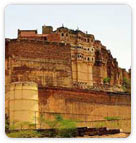 Today we take a guided tour of Jodhpur, visiting the Mehrangarh Fort (Majestic Fort), one of the most impressive & formidable structures anywhere in India. Built by Rao Jodha, this 5km long Fort is on a 125m high hill & has some magnificent palaces with marvelously carved panels latticed window. The Fort Museum houses an exquisite collection of palanquins, howdahs (Elephant saddles), royal cradles, miniatures paintings, musical instruments, costumes & furniture.
Today we take a guided tour of Jodhpur, visiting the Mehrangarh Fort (Majestic Fort), one of the most impressive & formidable structures anywhere in India. Built by Rao Jodha, this 5km long Fort is on a 125m high hill & has some magnificent palaces with marvelously carved panels latticed window. The Fort Museum houses an exquisite collection of palanquins, howdahs (Elephant saddles), royal cradles, miniatures paintings, musical instruments, costumes & furniture.
We also visit Jaswant Thada, a cluster of royal cenotaphs in white marble built in the year 1899 AD in memory of Maharaja Jaswant Singh II. Within the main cenotaph are the portraits of various Jodhpur rulers. It is an architectural landmark of Jodhpur.
Overnight Hotel – Jodhpur (B)
Day 08: Jodhpur - Jaisalmer (295 km – 8hr)
Today we drive to Jaisalmer, founded in the year 1156 by Bhatti Rajput ruler Rawal Jaisal. Often described as Golden City & rising from the heart of the Thar Desert like a golden mirage the commanding Fort etched in yellow sandstone, dominates the amber-hued city with its entire awesome splendor. Because of its strategic location it was an important ancient trading centre & camel caravans laden with precious spices & silk crossed the territory en-route India, Sindh, Arabia & Europe. The merchants of the 19th century built Havelis (Mansions) that are exquisitely carved from golden-yellow sandstone & are still in a beautiful condition. The life within the Fortified town conjures up images of medieval majesty visible in its narrow lanes strewn with magnificent palace, havelis, temples, & of course skilled artisans & ubiquitous camels.
Overnight Hotel – Jaisalmer (B)
Day 09: Jaisalmer
Full Day Tour
 Today we visit the old town of Jaisalmer & visit Jaisalmer Fort, built in the year 1156 by Rawal Jaisal. Perched on 80m high hill, housing the entire township within its ramparts, the golden hued Fort is standing like a sentinel in the bleak desert landscape. It is the only “Living Fort” in India & within its ramparts has an enchanting cow-web of narrow lanes dotted with some lovely Havelis (Mansions),Palaces & beautifully sculptured JainTemples of the 12th-15th century AD & of course skilled artisans & ubiquitous camels.
Today we visit the old town of Jaisalmer & visit Jaisalmer Fort, built in the year 1156 by Rawal Jaisal. Perched on 80m high hill, housing the entire township within its ramparts, the golden hued Fort is standing like a sentinel in the bleak desert landscape. It is the only “Living Fort” in India & within its ramparts has an enchanting cow-web of narrow lanes dotted with some lovely Havelis (Mansions),Palaces & beautifully sculptured JainTemples of the 12th-15th century AD & of course skilled artisans & ubiquitous camels.
We also visit magnificent Patwon Ki Haveli in the heart of the town. It was built by the rich merchant Guman Chand Patwa & his sons, whose business stretched between Afghanistan & China. It is the most elaborate & magnificent of all the Jaisalmer Havelis & is virtually the showpiece of Jaisalmer's legendary architectural wealth. The carving on stone far surpasses in beauty the work on brocade & gold. Later we drive down 40 km away from Jaisalmer to Sam to take the Camel ride on the Sand Dunes of Sam while the sun is setting down.
Overnight Hotel – Jaisalmer (B)
Day 10: Jaisalmer - Bikaner (325 km - 7 hrs)
Today we drive to the princely state of Bikaner, founded by Rao Bikaji (1465-1504 AD) in the year 1488 AD. He was a Rajput prince, descendent of the founder of neighboring Jodhpur. It lies in the north-western part of Rajasthan & has a stark beauty of the desert landscape with wide-spread sand dunes & thorny shrubs growing around. It is a royal city surrounded by a mammoth fortification wall, more than 5 km in circumference & about 5 to 9m high. Fort, Palaces & people with colourful traditional costumes are the chief attractions of the city. The Camel Breeding Farm in Bikaner is only one of its kinds in the whole Asia & so is the illustrious Camel Festival.
Later we visit Lalgarh Palace, built by Maharaja Ganga Singh (1881-1942) in the year 1902 in memory of his father Maharaja Lal Singh. It displays a magnificent blend of Rajput martial architecture with European interiors & was designed by the Englishman Sir Swinton Jacob. The intricate filigree & latticework on the red sandstone exhibit the refinements & delicacy of craftsmanship. The lush sprawling lawns with peacocks walking around & beautiful bougainvillea adorn the palace. We also visit Camel Breeding Farm, the only one in Asia.
Overnight Hotel – Bikaner (B)
Day 11: Bikaner – Mandawa (160 km - 4 hrs)
Half Day Tour
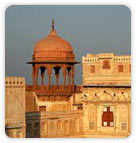 Today in Bikaner we visit Junagarh Fort, built in the year 1593 AD by Raja Rai Singh (1571-1612 AD), the 6th ruler of Bikaner. The Fort is a formidable structure & largely remained unconquered during its eventful history. It houses number of beautiful Palaces, Temples & Pavilions, which are richly decorated The beautifully maintained rooms of Anup Mahal now display the treasures of the Royal family. The Fort Museum has an extensive collection of illuminated manuscripts, jewellery, jars, carpets, weapons, treaties, decorations & Farmans (King’s Orders).
Today in Bikaner we visit Junagarh Fort, built in the year 1593 AD by Raja Rai Singh (1571-1612 AD), the 6th ruler of Bikaner. The Fort is a formidable structure & largely remained unconquered during its eventful history. It houses number of beautiful Palaces, Temples & Pavilions, which are richly decorated The beautifully maintained rooms of Anup Mahal now display the treasures of the Royal family. The Fort Museum has an extensive collection of illuminated manuscripts, jewellery, jars, carpets, weapons, treaties, decorations & Farmans (King’s Orders).
Later we drive to Mandawa in the heart of the semi-arid Shekhawati region. Shekhawati owes its name to Rao Shekha who ruled this area in the 14th century. The Fort of Mandawa was built in the year 1755 by Thakur Nawal Singh, the founder of the town. These were the times when Mandawa was settled & fortified by the rich & dominant Silk Route merchants of the region, who constructed many Havelis (Mansions), Chhatris (Cenotaphs), Temples & Baolis (Step-wells) with ornate frescoes adorning their walls & now aptly given the epithet – Open-Air Gallery. With the migration of these merchant families, their old settlements remained in total obscurity with no one to look after them. Mandawa still retains the charm & aura of a bygone era & coming here is like stepping into a different world.
Overnight Hotel – Mandawa (B)
Day 12: Mandawa – Delhi (280 km - 6 hrs)
Mandawa makes a good base for visiting the Havelis of the region, which are spread all over the towns of Shekhawati.
Today we explore the Mandawa Fort, located in the very heart of Mandawa & a classic example of the famed Rajput style of architecture. It houses many beautiful paintings & frescoes that dazzle the eyes & now been converted into a heritage hotel. Gulab Rai Haveli built in the year 1870 that has some of the best murals in Shekhawati on both the exterior & interior walls with elephants & camels on its façade. Goenka Double Haveli, built in the year 1890, with monumental frescoes of elephants & horses decorating its façade. Bansidhar Newatia Haveli built in the year 1921 combines traditional frescoes of horses & elephants with those depicting a young boy using a phone plus opulent touring cars & the Wright Brothers’ plane. If time permits we may visit more Havelis of the region & observe the colourful village life in Rajasthan.
Later we drive to Delhi, upon arrival in Delhi Transfer to Airport for onward Destination.
Our tour concludes: Caper thanks you for your patronage & look forward to serve you again in future.
Package includes:
Package does not include: